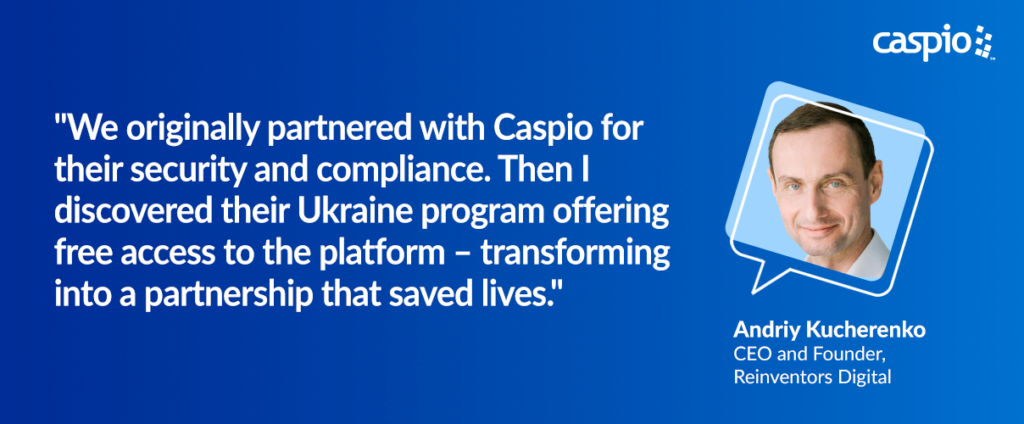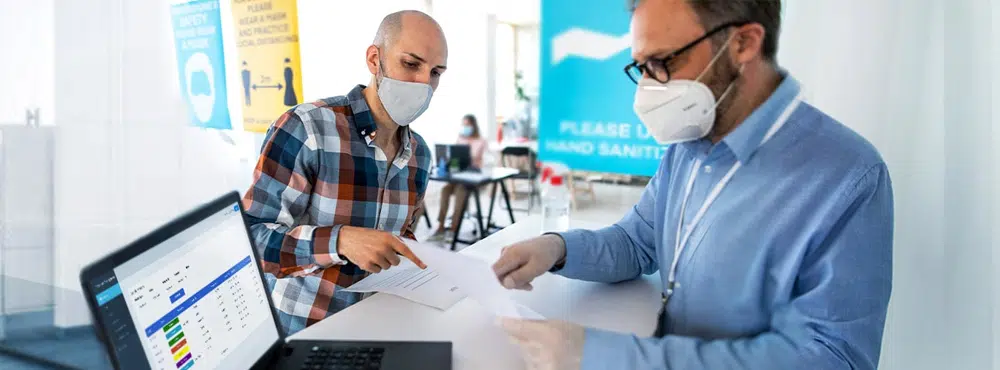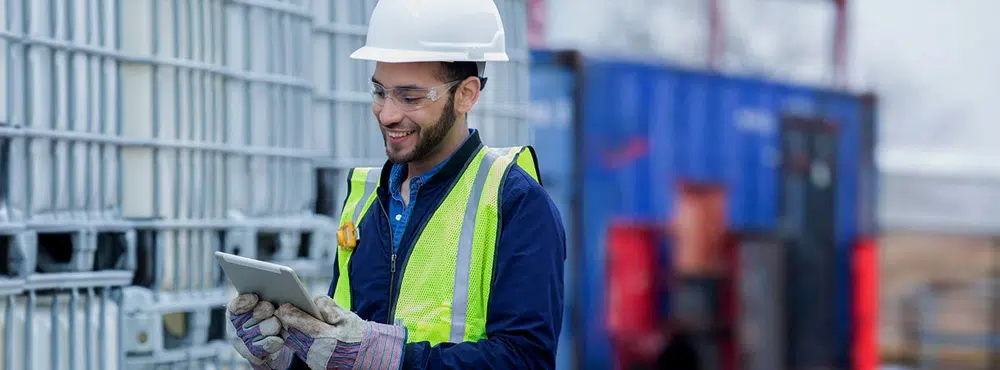
When Russian forces attacked Ukraine on February 24, 2022, millions of Ukrainians were instantly cut off from their supply chain.
No goods could be delivered through from its north and east borders, which it shared with Russia and Belarus. Its ports in the south were also closed as Russia took complete control of the Black Sea. With only its western borders left, logistics became a matter of life or death.
Overnight, the entire country pivoted. Those who did not fight on the frontlines shifted their focus to support the war effort.
Among them were the BGV Charity Fund and Reinventors Digital.
Coming Together for the Country
The BGV Charity Fund was created as the nonprofit arm of the BGV Group Management, a private investment firm based in Ukraine. The fund was established to support the victims of the country’s humanitarian crisis during the war.
At the outset of the conflict, BGV Group Management members collaborated with representatives from various Ukrainian businesses, mainly in the financial sector, to establish a new entity and pivot from investments to logistics. Providing food, medicine and other vital supplies to war victims became the priority. And within a matter of weeks, the organization’s lawyers, analysts and other finance professionals had to become humanitarian and logistics experts to help rebuild the country’s supply chains.
FOR THE PEOPLE: Logistics is vital to disseminate aid to war victims.
Source: Rubryka.com
As the conflict intensified, it became increasingly crucial for the organization to track and document each donation they received and distributed to communities in need. However, their existing processes proved insufficient as their operations expanded beyond their capacity.
To address this urgent need, BGV partnered with Reinventors Digital.
From Pandemic to War: Responding to Urgent Needs
Reinventors Digital, a software development company with offices in Poland and Ukraine, is no stranger to crisis. It was founded in 2021, at the height of the COVID-19 pandemic.
A “tech-agnostic” company, they utilize various technologies to build and deploy digital solutions for clients. Primarily, they specialize in business automation and creating custom applications using no-code and low-code development.
When BGV tapped them for help, the Reinventors Digital team knew they needed a secure and versatile platform to build the fund’s “impossible” logistics app.
Caspio delivered.
Forging a Meaningful Partnership
Reinventors Digital’s partnership with Caspio came about at just the right time.
They were slated to sign a business contract with a healthcare provider – then the Ukraine war broke out the day before their meeting. In response to the crisis, Reinventors Digital teamed up with BGV and together, they envisioned an all-in-one system that could automate the fund’s entire logistics and inventory process.
CEO and Founder Andriy Kucherenko originally came across Caspio, realized that the platform included everything needed to develop custom low-code solutions and eventually signed up as a Caspio partner. Not long after, Kucherenko saw Caspio’s Stand With Ukraine program offering free use of its low-code platform in support of the war effort and Ukrainian citizens.
Within two weeks, his team created the prototype on Caspio.
“Users found the Caspio application to be more usable and intuitive than the original version built on a different technology,” Kucherenko noted.
The app has been instrumental in providing aid to thousands of war victims. Since its launch, over 300 trucks of donations and 6,000 tons of cargo carrying supplies such as food and other necessities have been transported to communities in need.

IN THIS TOGETHER: BGV Charity Fund and its partner organizations work around the clock to address the needs of Ukraine war victims.
Despite the remarkable results, the journey to success wasn’t always a smooth one for the team at Reinventors Digital.
A Time for Reinvention
Prior to developing the app, BGV faced numerous challenges centralizing their volunteer efforts, mainly due to the chaos caused by the war and the absence of adequate systems.
“There was a lot of uncertainty in the early days. Humanitarian aid cannot be done without proper controls,” said Kucherenko. “Donor companies want to know and ensure cargo is delivered to the right recipients. There are also some legal requirements.”
The fund relied on Kucherenko’s experience developing custom digital solutions to address this challenge. But while the Reinventors Digital team had experience in automating operations management workflows, they still needed guidance on logistics work.
When they contacted logistics experts for advice on how to build the app, they were told it “simply wasn’t possible” due to the current war conditions. “Standard logistics applications are designed to serve in a well-controlled, stable environment with proper warehouses,” Kucherenko explained.
On the contrary, they had no warehouses. They considered “anything with a roof” to be a suitable warehouse, and received and disseminated shipments wherever and whenever they could. They also did not have barcode scanners nor sophisticated technology to help them track the donations and plan stock movements.
But Reinventors Digital decided to try anyway.
“After a few experiments, we found a way to simplify the tools in the field – just a laser printer and smartphones – while moving everything else to the cloud,” Kucherenko shared.
He and two developers leveraged Caspio’s low-code platform to build the solution. After several days, the “impossible” app is already up and running.
Making the Impossible Possible
The Caspio-powered logistics app monitors all the shipments BGV receives and deploys from their warehouses. It records crucial data, such as shipment origin, destination city, loading truck balance, inventory count, repackaging details and more. This allows the organization and its partners to carefully monitor supplies and keep a system of record amidst evolving change, conflict and uncertainty.
Kucherenko describes their logistics process as a mixture of “steampunk and cyberpunk,” saying, “We combined artificial intelligence with technologies of the previous century.”

GETTING THE JOB DONE: Reinventors Digital designed labels that were “not pretty” but were readable by both people and machines to keep accurate records.
In place of barcodes and tracking numbers, they made simple labels that served three purposes: to be readable by warehouse staff even from a distance, to be easily scannable by any available barcode scanner and to be readable by computers and AI.
While their warehouses aren’t equipped with proper facilities, the field staff have smartphones with cameras. They use their phones to take photos of the labels and upload onto a designated Google Drive folder.
This is where the “digital magic” happens.

SMART APPLICATION: The Caspio-powered logistics app checks the warehouse label photos and sends them to Google Vision for post-processing before categorizing them properly in a custom table.
The Google Drive folder is connected to the Caspio-powered logistics app through API, which automatically scans the uploaded images using Google Vision. To improve the scanning accuracy, Reinventors Digital created a custom script to catch any photos that Google Vision may have missed, bringing up its accuracy rate to 99%.
Upon scanning, the information gets automatically logged in the Caspio database. And it’s not just the pictures – the app also categorizes each item accordingly. “It turns from picture to metadata within two minutes. Nobody needs to enter that information manually into the system,” Kucherenko explained.
When a warehouse or recipient receives the cargo, it only takes a couple of minutes to record the delivery transaction. “The entire intake process takes about 10 minutes to complete, with manual work minimized and replaced by automation,” he further explained.
Best of all, the app has no learning curve. Users could immediately get to work with a basic smartphone. Even those without any prior logistics experience can easily manage the movement of supplies.
Making the Most of Caspio’s Low-Code Platform
Kucherenko shared the most notable improvements they experienced after building the app on Caspio.
Automated Workflows
BGV automated the process of extracting and tracking information in a secure and centralized online database. Before this, the organization needed several people to review invoices, messaging threads and other data sources before manually logging the information in a Google Sheet.
With Caspio, data is automatically reviewed and sorted. After users take photos of the labels and upload them to their local folder, Caspio consolidates and categorize the information through its automated workflow features.

INSTANT CATEGORIZATION: With the cloud-based app, volunteers no longer need to input data manually into spreadsheets.
“It’s like the work of barcode scanners and a comprehensive WMS (warehouse management system) program. We did the same — without an expensive and complicated WMS system or barcode scanners,” Kucherenko emphasized. “We got the same results.”
Data Integration
Once users have uploaded the label images to Google Drive, Caspio connects with several external systems to process the information. The app utilizes Google Vision and a custom script to review the file, scan the image for text content and extract the corresponding data.
Reporting Tools
Kucherenko also appreciates Caspio’s customizable reports and pivot tables, which offer instant visibility and key metrics for the most critical aspects of their logistics process.

CLEAR VISIBILITY: Reinventors Digital uses Caspio’s native reporting tools to gain actionable insights and make informed decisions based on the latest data.
With Caspio’s point-and-click tools, users can easily create online reports tailored to their exact requirements, including dashboards, process workflows, charts and graphs, as well as custom filtering and pivot tables. These capabilities ensure proactive decision-making is based on real-time data.
Ultra-Fast Iteration
With all the uncertainties and constant changes during the war, building apps on Caspio allowed Kucherenko and his team to move fast and iterate easily to keep up with new developments.
“Building the app with Caspio was really easy. With full code, we’d spend more time discussing what we plan to do than actually developing the solution.”
And since everything is based in the cloud, the latest data and application is served in real-time, preventing errors and miscommunication among their multiple logistics teams.
Scalability
Lastly, Caspio’s built-in scale proved to be instrumental in handling multiple data and images regularly.
“Photos of cargo for only one delivery can easily take 1GB of space. And all these files are quickly processed within a few minutes, creating zero problems for anyone,” Kucherenko shared.
Caspio offers unmatched scale for millions of records, simultaneous transactions and unlimited users. Its infrastructure runs on Amazon AWS and Microsoft SQL Server, providing best-of-breed technology for organizations of all sizes.
Supporting the War Effort Until the End
To date, BGV has delivered over 6,000 tons of cargo to Ukraine’s war victims— all using the logistics app built by Reinventors Digital. And the number keeps growing.
Both organizations are now focused on supporting the war effort until the end. For one, all of Reinventors Digital’s profits go straight to the Ukrainian armed forces, and they will produce more apps as needed.
We needed to build an emergency response supply chain solution quickly. Using spreadsheets was not an option and existing logistics software was too inflexible in a crisis. With Caspio, we created a custom solution to meet each unique challenge — all within two weeks.
Andriy Kucherenko
CEO and Founder
Reinventors Digital
Learn more about the unique solution built by Reinventors Digital on their blog.
If you have an application in mind to help Ukraine, we invite you to build apps on Caspio for free.
You also can sign up for a free trial to experience Caspio’s low-code development platform for yourself.
















